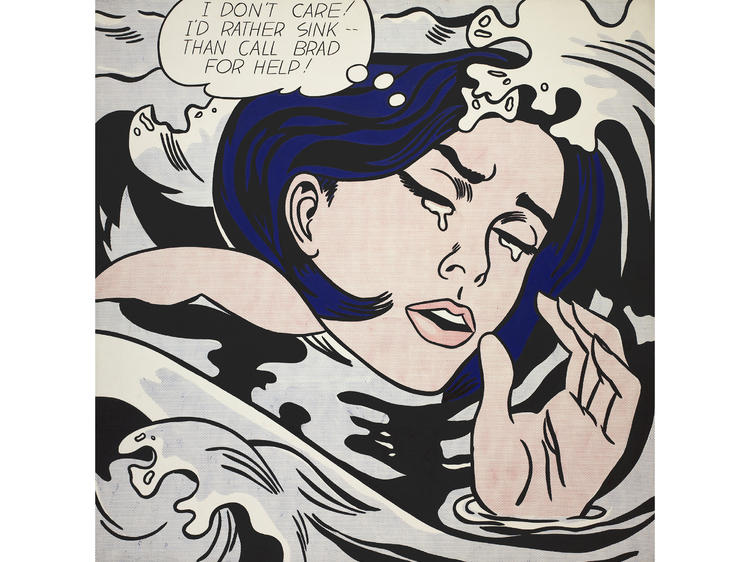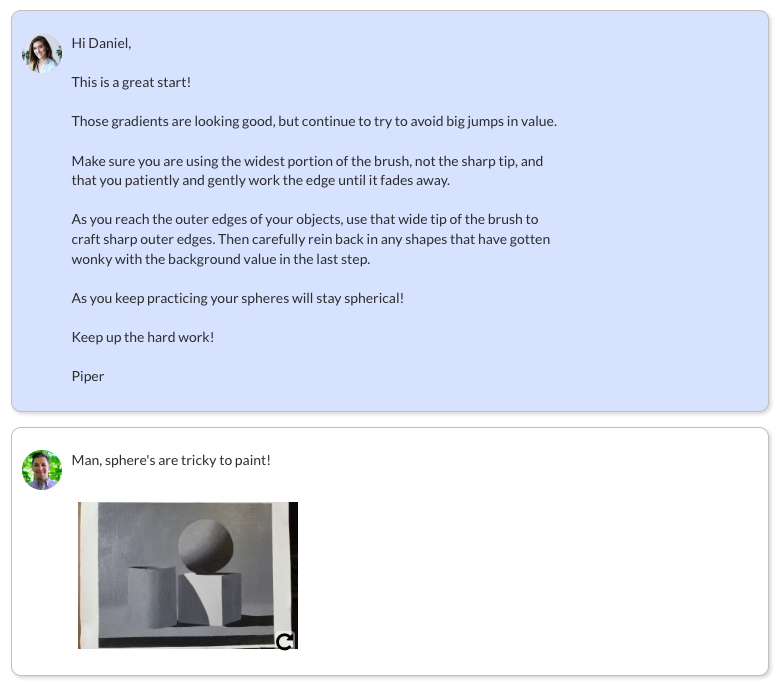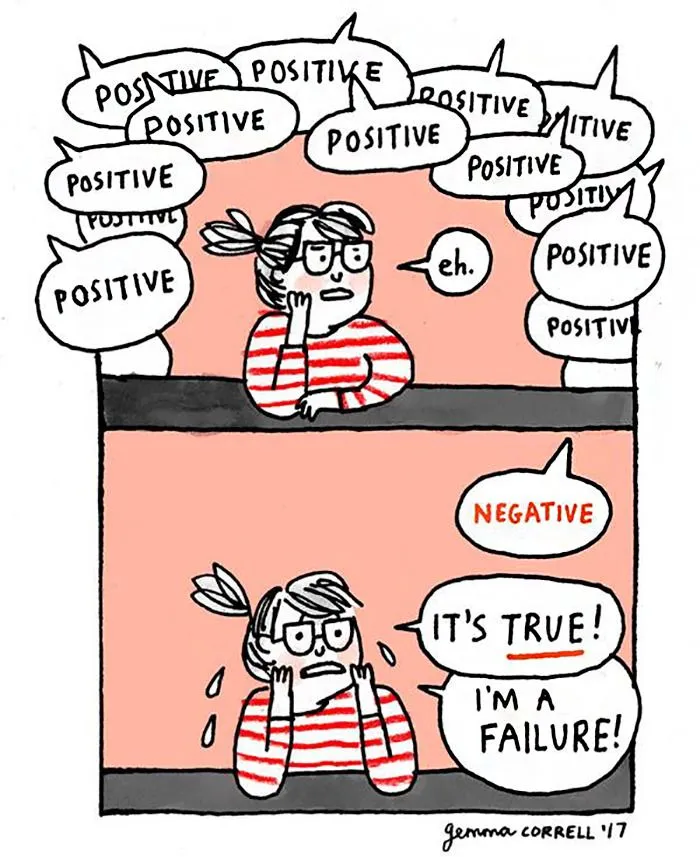Struggling with feedback is a normal part of being an artist. But let’s be honest, it’s painful to receive feedback, and many art students find themselves avoiding it.
We understand why. You’re putting yourself out there and receiving unnecessarily harsh or unconstructive criticism feels horrible.
At Evolve Artist, providing feedback on our student’s work is a huge part of what makes our program effective. Learning how to receive constructive art feedback is a skill. So we’re sharing everything we know in our series on Constructive Art Criticism (Other posts in the series are HERE and HERE).
Last week, we broke down how you know what feedback is worth listening to. In today’s post, we’re sharing our tips on how you can approach that feedback with the best mindset. You don’t have to love what you hear, but you can still learn from it.
Your self-talk has a huge impact on how you receive feedback and as a result, how much you’ll grow. What do you say to yourself in those moments?
Mantras and reminders can help to keep your mindset in check. Here are our 6 self-talk tips on how to achieve a growth mindset.

Struggling with how to take art criticism? Our mindset is often the difference between feeling empowered by feedback or victimized by it. (Roy Lichtenstein, Drowning Girl, 1963)
Tip 1: “It’s not personal”
It might FEEL personal, but that doesn’t mean it IS personal.
It feels personal because art is personal - blood sweat and tears go into your work. So in the midst of it feeling personal, first remember the feedback doesn’t say anything about your worth as an artist or your future capabilities.
Constructive feedback is about your artwork, not your artistic worth.
Especially if you have a teacher or community you trust, the feedback is just that, feedback. It is something that can be objectively applied to your work.
All the self-talk tips we are sharing today are here to help you approach feedback with a mindset that makes it less personal.
If you hear a voice within you say 'you cannot paint,' then by all means paint, and that voice will be silenced.
Vincent Van Gogh
Tip 2: “This is fuel for my growth, and growth is worth it”
A bit part of knowing how to take art criticism is recognizing it’s an opportunity to grow.
So many students find themselves struggling and assume they don’t have the natural talent to be professional artists. They think, ‘Shouldn’t this be easier?’ and they give up on their dreams.
A proven curriculum that teaches the fundamentals of art definitely makes it easier. But in the end, it’s not easy. No matter what you're working at, growth comes with discomfort.
What makes an artist is not natural talent, it’s consistent hard-won effort. It’s the hours at the easel working on a painting and putting your work out there for critical feedback. All of that - not easy.
Every piece of feedback you receive gives you the opportunity to focus that time and effort on the areas you need improvement. This is fuel for your growth.
Don’t believe in the natural talent myth. Stick with your passions and grow with the discomfort. As Albert Einstein said, "It's not that I'm so smart; it's just that I stay with problems longer."
It's not that I'm so smart; it's just that I stay with problems longer.
Albert Einstein
Tip 3: “I can sit with this.”
Try this, next time you hear feedback on your artwork, instead of responding right away to explain your perspective or to solve the problem, tell yourself, “I can sit with this”.
A very human reaction to discomfort is to make it OVER as soon as possible. So when we hear feedback, instead of listening, we often times respond right away to make it go away.
This reaction can rob you of the reflection that needs to happen to improve your work.
Listen, really listen. Put all your explanations to one side when learning how to take art criticism. Sit with the feedback and mull it over.
Most people do not listen with the intent to understand; they listen with the intent to reply.
Stephen R. Covey
Tip 4: “I can ask for help”
Sometimes the feedback you receive is just not that clear. And even people with the best of intentions can provide vague feedback. This lack of clarity doesn’t discount the feedback, but it does require clarification.
Part of learning how to take art criticism is being unafraid to ask questions. The better you understand the feedback and the possible solutions, the more helpful it is for your work.
If you’ve sat with the feedback, and you still don’t understand it, follow up with the person who gave the feedback. Schedule a 1-1, grab a coffee, and send that email.
If following up with the person who gave you the art critique is not possible, ask a peer for their perspective.
At Evolve, our students can participate in chat rooms, Facebook groups, and you can also book a 1-1 with our instructors. If you need to speak with someone, somebody is always available. Because you're never without the support you need, you learn how to take art criticism.
If you have something similar, use the resources that are available to you.
Tip 5: “They have my best intentions at heart.”
Some feedback can be harder to swallow than others. If you’ve already established that this feedback is worth listening to - remind yourself that the feedback is coming from a community you trust that has your best intentions at heart.
Feedback can be blunt. Lots of instructors have different styles of delivering art critiques, and it’s not usually given with a spoon full of sugar.
At Evolve, we provide feedback directly and plainly. For us to do the best for our students, we must be honest. This is how we build trust and provide an exceptional fundamental education in art. This means you’re not always going to like what you hear.
This is not about abusive or needlessly cruel criticism. That feedback is NOT worth listening to. And at Evolve, that is NOT our ethos.
We are here to push our students to get better and improve. We love seeing our students have artistic breakthroughs through the program, and that comes through clear, honest guidance.
Remind yourself of the intentions of the person giving the feedback. They are here to build you up.

Personalized feedback is an important part of the learning process and knowing that you are receiving feedback from someone who wants you to succeed goes a long way (Evolve’s homework tool).
Tip 6: Hunt the good stuff
It's human nature to focus on the negative. We’re literally wired to focus on risks and threats in our environment - it’s called negativity bias. Because of this, it’s hard to notice the positives.
The best way to counteract this is to “Hunt the good stuff.” If it feels like an endless stream of difficult art critiques, pause and take a moment to find some positives.
Did any of the feedback say what you’ve done well?
Was there an area you have been aiming to improve that is now a non-issue?
Even though the art critique is tough, is there anything you’re grateful for?
What do you love about painting? Can you reconnect with that?
By intentionally focusing on the positives, it can build your resilience as an artist so you can continue to put time and effort into achieving your artistic dreams.

It can be easy to overlook the positives and focus on the negatives.
How to take art criticism - Bringing it all together
Receiving and applying feedback is essential to your growth as an artist.
Building a growth mindset battles negativity bias and helps you turn the feelings that come with difficult feedback into tangible constructive action.
We hope these 6 self-talk tips help you build that resilience.
Providing constructive criticism in a supportive environment is part of what the Evolve program is all about.
If you’re wanting to join a community that has got your back, Evolve could be the program for you! You can read more about our curriculum and REAL student success stories HERE.
You can also check out our FREE 60 min Masterclass “The Amateur Artist’s Guide to Professional Level Art Skills” - CLICK HERE.
Want to learn more about how to deal with art critique? Here are the other posts in our Constructive Art Criticism series:
- 4 signs that feedback is worth listening to (and what to ignore)
- How to deal with art critique – 8 things you can do today to apply feedback effectively
Happy painting!
